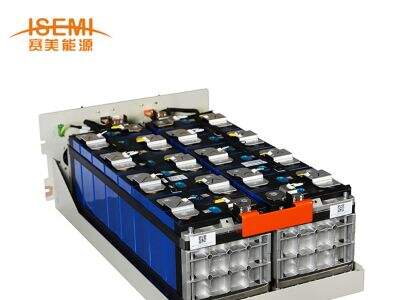লিথিয়াম-আয়ন ব্যাটারি: লিথিয়াম-আয়ন ব্যাটারির আশ্চর্যজনক বৈশিষ্ট্যের কারণে এটি অত্যন্ত জনপ্রিয়। এদের সবচেয়ে ভালো বিষয় হলো, আপনি এগুলি পুনরায় চার্জ করতে পারেন, তাই সবসময় নতুন কিনতে হয় না। এই ব্যাটারি সাধারণত ল্যাপটপ থেকে স্মার্টফোন, ইলেকট্রিক গাড়ি এবং বিমান পর্যন্ত বিশ্বব্যাপী ঘরে এবং ব্যবসায়ে ব্যবহৃত হয়। এছাড়াও এগুলি সৌর প্যানেল এবং বায়ু টারবাইন থেকে উৎপন্ন শক্তি সঞ্চয়ের জন্য খুবই উপযোগী, যা পুনর্জীবনশীল শক্তির ব্যবহারকে আরও দক্ষ করে।
ব্যাটারি স্টোরেজের জন্য গুরুত্বপূর্ণ বিষয়সমূহ
লিথিয়াম-আয়ন ব্যাটারি সংরক্ষণের সময় আপনাকে এদের উদ্দেশ্যমূলক ব্যবহারকে মনে রাখতে হবে। ঘরের ব্যবহারের জন্য একটি ব্যাটারি সংরক্ষণের উপায় ব্যবসার জন্য একই নয়। বিভিন্ন ব্যবহার বিভিন্ন সংরক্ষণ প্রয়োজন নির্দেশ করে।
সঠিক সংরক্ষণ
লিথিয়াম-আয়ন ব্যাটারি সঠিকভাবে সংরক্ষণ করা তাদের ভালোভাবে কাজ করতে এবং সম্ভবত সবচেয়ে বেশি সময় টেনে আনতে গুরুত্বপূর্ণ। যদি আপনাকে এই ব্যাটারি সংরক্ষণ করতে হয়, তবে এখানে কিছু গুরুত্বপূর্ণ বিষয়:
তাপমাত্রা: লিথিয়াম-আয়ন ব্যাটারির জন্য আদর্শ সংরক্ষণ তাপমাত্রা ২০-২৫°সি (৬৮-৭৭°F) বা ঘরের তাপমাত্রা। খুব উষ্ণ বা খুব ঠাণ্ডা তাপমাত্রায় রাখা ব্যাটারিকে ক্ষতিগ্রস্ত করতে পারে বা ব্যবহারের জন্য অপরিচ্ছন্নও করতে পারে। একটি শীতল এবং শুকনো জায়গায় সংরক্ষণ করা আদর্শ।
আর্দ্রতা: লিথিয়াম-আয়ন ব্যাটারি শুকনো পরিবেশে সংরক্ষণ করা উচিত। বেশি আর্দ্রতা করোশন এবং ক্ষতি ঘটাতে পারে, যা ব্যাটারির পারফরম্যান্সে প্রভাব ফেলতে পারে। ব্যাটারিকে শুকনো জায়গায় রাখা তাকে সুরক্ষিত এবং নিরাপদ রাখে।
চার্জের মাত্রা: লিথিয়াম আয়ন ব্যাটারি স্টোরেজ কন্টেইনার এগুলি চার্জ সঙ্গে সংরক্ষণ করতে পছন্দ করে, বিশেষত ৪০-৬০% পরিসরের মধ্যে। এটি অতিচার্জ এবং ব্যাটারি ক্ষতি এমন সমস্যা এড়ানোর সাহায্য করে, যা ব্যাটারিকে খুব বেশি ড্রেন হতে বাধা দেয় এবং এটি ক্ষতি ঘটাতে পারে।
লিথিয়াম-আয়ন ব্যাটারির স্টোরেজ এবং পারফরম্যান্স চরমে তুলতে
লিথিয়াম-আয়ন ব্যাটারিগুলিকে যতটা সম্ভব ভালভাবে সংরক্ষণ করতে হলে, এখানে কিছু শ্রেষ্ঠ পদক্ষেপ রয়েছে।
ডাস্ট এবং মোইসচার বাইরে রাখার জন্য ডিজাইন করা একটি কন্টেইনার ব্যবহার করুন। এটি ব্যাটারিকে ক্ষতি থেকে রক্ষা করে।
অন্তর্বর্তীকালে ব্যাটারির চার্জ লেভেল পরীক্ষা করুন। যদি দেখেন যে চার্জ কমে গেছে, তাহলে তা সঠিক লেভেলে ফিরিয়ে আনুন এবং সেখানে রাখতে নিশ্চিত করুন।
ব্যাটারিকে সরাসরি সূর্যের আলোতে বা অত্যন্ত উচ্চ বা নিম্ন তাপমাত্রায় প্রায়োগ করবেন না। আপনার ব্যাটারির জীবনকাল বাড়ানোর জন্য এই শর্তগুলি থেকে দূরে রাখুন।
ব্যাটারি কে একটি ভালোভাবে বায়ুমিশ্রণযোগ্য এলাকায় রাখুন। এর অর্থও হলো যে ঐ এলাকা ভালোভাবে বায়ুমিশ্রণযোগ্য হওয়া উচিত, যাতে যে গ্যাস জমা হতে পারে তা সহজেই বেরিয়ে যেতে পারে।
যদি আপনি এই লিথিয়াম-আয়ন ব্যাটারি সংরক্ষণের পরামর্শগুলি মনে রাখেন, তবে আপনি আপনার ব্যাটারির বেশি পারফরম্যান্স এবং দীর্ঘ জীবন পাওয়ার সাহায্য করতে পারেন, যেন তা আপনার প্রয়োজনে সবসময় ব্যবহারের জন্য প্রস্তুত থাকে।
লিথিয়াম-আয়ন ব্যাটারির বিশেষ সংরক্ষণের প্রয়োজন
এখানে কিছু সংরক্ষণের বিষয় আছে যা বিশেষভাবে সম্পর্কিত লিথিয়াম স্টোরেজ ব্যাটারি যার কথা আপনাকে জানা উচিত। সকল ব্যাটারিতেই দুর্বলতা থাকে, কিন্তু অন্যান্য ধরনের ব্যাটারির তুলনায় লিথিয়াম-আয়ন ব্যাটারি তাপমাত্রা এবং আর্দ্রতা স্তরের প্রতি সংবেদনশীল। তা অর্থ হলো যদি তাদেরকে সঠিক শর্তাবলীতে সংরক্ষণ না করা হয় তবে তারা আরও সহজেই ক্ষতিগ্রস্ত হতে পারে। তারা ক্ষতি থেকে বাঁচানোর জন্য আংশিকভাবে চার্জ থাকা অবস্থায় সংরক্ষণ করা উচিত।
এই ব্যাটারির সম্পর্কে আরও একটি জিনিস মনে রাখতে হবে যে তারা একটি চক্রের ভিত্তিতে কাজ করে। সময়ের সাথে তারা কম চার্জ ধারণ করবে এবং নতুন চার্জের তুলনায় তা ভালভাবে ধরতে পারবে না। এর অর্থ হল শেষ পর্যন্ত, আপনাকে এগুলি প্রতিস্থাপন করতে হবে। কিন্তু এগুলি সঠিকভাবে সংরক্ষণ করা এদের জীবন বর্ধিত করতে এবং সামগ্রিকভাবে এদের ব্যবহারযোগ্যতা বাড়াতে সাহায্য করতে পারে।
ঘরে এবং ব্যবসায় ব্যাটারি সংরক্ষণ পদ্ধতির মধ্যে পার্থক্য নির্ধারণ
লিথিয়াম-আয়ন ব্যাটারি সংরক্ষণের প্রয়োজন ঘরে বা ব্যবসার জন্য প্রচুর পার্থক্য আছে।
ঘরে লিথিয়াম-আয়ন ব্যাটারি সাধারণত ছোট মাপের হয়, যা সেল ফোন, কম্পিউটার, এবং চার্জিং ব্যাঙ্কের মতো যন্ত্রপাতিকে চার্জ করে। এগুলি সৌর প্যানেল বা বায়ু টারবাইন থেকে সংগৃহীত শক্তিকেও সংরক্ষণের জন্য ব্যবহৃত হতে পারে। ঘরের জন্য এই ছোট ব্যাটারিগুলি সাধারণত একটি আলমারিতে, একটি ফ্রেমে, বা অন্য একটি সুরক্ষিত এবং সহজে প্রাপ্ত স্থানে রাখা হয়।
এই শিল্পকায় ব্যবহারে, লিথিয়াম-আয়ন ব্যাটারি বড় অ্যাপ্লিকেশনে ব্যবহৃত হয়, যেমন ইলেকট্রিক ভাহিকেল পাওয়ার এবং সৌর ফার্ম থেকে শক্তি সঞ্চয়। এই ব্যাটারি সাধারণত ঘরে ব্যবহৃত ব্যাটারির তুলনায় বড় এবং শক্তিশালী। এগুলি বড় এবং শক্তিশালী এবং সংরক্ষণ এবং চালু রাখার জন্য নিরাপদ দ্বিগুণ বাধা স্থান প্রয়োজন।
এটি সমাপ্ত করতে, নিশ্চিত করতে হবে যে লিথিয়াম আয়ন স্টোরেজ ব্যাটারি সঠিকভাবে সংরক্ষিত হয় এটি তাদের রক্ষণাবেক্ষণের জন্য গুরুত্বপূর্ণ এবং এটি আরও দীর্ঘস্থায়ী করে। তাপমাত্রা, শীতলতা এবং চার্জ স্তরের সোনার নিয়ম। আপনার ব্যাটারি সংরক্ষণ অপটিমাইজ করতে হলে লিথিয়াম-আয়ন ব্যাটারির বিশেষ সংরক্ষণ প্রয়োজনের বোঝাতে হবে এবং ঘরে এবং ব্যবসা ব্যবহারের জন্য তাদের সংরক্ষণের মধ্যে পার্থক্য। আপনার ব্যাটারি থেকে সর্বোচ্চ উপকার নেওয়ার একটি উত্তম উপায়। ইসরায়েল ঘরে এবং ব্যবসা ব্যবহারের জন্য লিথিয়াম-আয়ন ব্যাটারিতে বিশেষজ্ঞ। আমরা এছাড়াও এই ব্যাটারি সংরক্ষণ এবং রক্ষণাবেক্ষণের মূল্যবান পরামর্শ দিই যাতে আপনি এগুলি থেকে সর্বোচ্চ জীবন এবং পারফরমেন্স পান এবং আপনার প্রয়োজনে সবসময় প্রস্তুত থাকে।

 EN
EN
 AR
AR BG
BG DA
DA NL
NL FI
FI FR
FR DE
DE EL
EL HI
HI IT
IT JA
JA NO
NO PL
PL PT
PT RO
RO RU
RU ES
ES TL
TL ID
ID UK
UK VI
VI TH
TH TR
TR AF
AF MS
MS BE
BE AZ
AZ BN
BN JW
JW KN
KN KM
KM LO
LO LA
LA MY
MY UZ
UZ KY
KY LB
LB XH
XH
